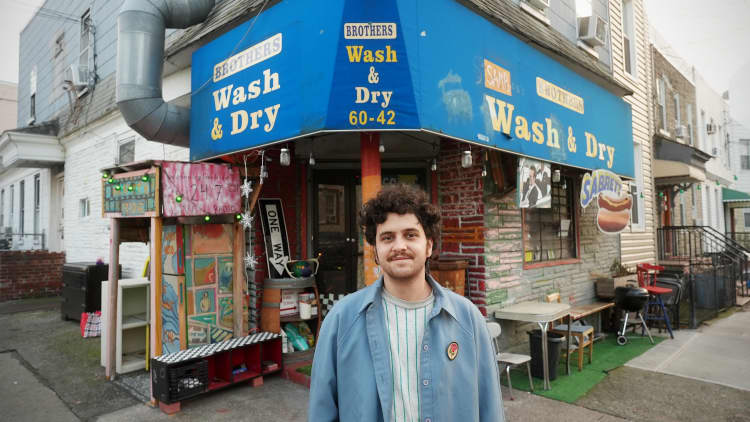What's worse: knowing or not knowing?
That's the question Mike, an account executive at a large tech firm in Los Angeles, asked himself a few weeks ago as he watched dozens of his co-workers lose their jobs through a computer screen.
Although Mike didn't get laid off, the most recent round of job cuts has left him feeling a bit more pessimistic and existential than usual. Some mornings are harder to log on for work than others.
He requested CNBC Make It withhold his last name and the name of his company so he could speak freely about his employment situation.
"It's really scary," the 37-year-old says. "I often ask myself, 'Why am I working right now if I might not have a job in two months?'"
Despite months of record-low unemployment rates, workers are feeling increasingly anxious about their job security due to a recent wave of layoffs at dozens of companies including Goldman Sachs, Microsoft and Meta. Earlier this week, Meta announced plans to lay off at least 10,000 employees, its second major round of job cuts in the last six months alone.
More than two in five U.S. employees (42%) are worried about losing their jobs in a potential recession, and nearly half (47%) say they have changed their behavior at work to avoid being laid off, according to a recent Harris Poll/Justworks survey of over 1,000 working Americans.
Living in fear of losing your job can be crippling — but confronting your layoff anxiety head-on is the best way to beat the panic.
Here are three strategies to cope with layoff anxiety.
Intercept 'stinking thinking'
The ambiguous, uncertain threat of a layoff is the most difficult part to deal with, according to Christopher Hansen, a licensed professional counselor with Thriveworks in San Antonio, Texas.
"I've noticed the anxiety for people that survive mass layoffs is almost as bad as the anxiety people who actually lost their jobs feel because they're stuck in purgatory wondering if they're next on the chopping block," he says. "That generates a lot of angst and anxiety."
This fear of the unknown causes a lot of people to fall into a vicious cycle of "stinking thinking," which Hansen describes as "constant fretting about the worst-case scenario."
To stop spiraling, negative thoughts about losing your job, write them down: Hansen recommends noting where you are and what you are doing when you start to feel anxious, to identify what triggered such feelings, as well as your belief about the situation.
For example: "We just had a meeting where 10% of our staff lost their jobs, and now I am worried about losing my job and not being able to afford my rent."
Then, replace each negative thought with a positive, realistic affirmation. For example: "Just because my co-workers got fired, doesn't mean I am going to lose my job tomorrow."
Focusing on the present can help you ground yourself and feel more in control of the situation. Practice this strategy for a couple of weeks and it will become a habit that "really, really helps," Hansen says.
Detach your identity from your job
Spending more time on the hobbies, relationships and interests that bring you joy outside of work is another powerful antidote to layoff anxiety.
"When you're under that kind of stress, it starts to bleed into your personal life, your relationships, and can quickly zap your ability to enjoy anything else," Hansen warns. "But we are whole people outside of our 9-to-5's, and it's important to remind yourself of that."
David Jacobowitz learned the pitfalls of defining yourself by your job early on in his career: He survived multiple rounds of layoffs just months after graduating college in 2015, at his first full-time marketing job.
"It was incredibly tense," he recalls. "It didn't feel like there was a light at the end of the tunnel … I felt like I could be laid off at any moment."
Finally, after working at several tech companies including TikTok and Meta, the 29-year-old decided that he cared less about having impressive names on his resume and more about spending his time on the creative pursuits that excited him.
"The most important lesson I learned from my career up to this point is that work is work and you can't make it your life because things will happen out of your control, and they won't always be good," Jacobowitz says.
In 2020, Jacobowitz launched his own business, Nebula Snacks, which makes treats like zero-sugar, dairy-free chocolate.
Being his own boss, Jacobowitz jokes, gives him ultimate job security: "It's not like I can fire myself!"
Lean into your transferable skills
While Mike is relieved he still has his job, he sometimes questions why he was chosen to stay when other talented, high performers were let go.
To alleviate such feelings, Mike has started ramping up his professional networking, researching courses on in-demand technical skills and volunteering to help with projects on other teams that interest him.
Being proactive about your professional development is a great way to channel your nervous energy and boost your self-esteem, Hansen says.
Ultimately, what's helped Mike keep his layoff anxiety at bay is reminding himself of everything he's accomplished in his career thus far, like landing a job at a competitive tech firm in the first place.
"Surviving a layoff has weirdly made me more confident," he says, "which has been a bright spot in an otherwise terrible situation."
DON'T MISS: Want to be smarter and more successful with your money, work & life? Sign up for our new newsletter!
Check out:
Layoffs are set to continue. But workers from this sector may escape
Burnout is on the rise worldwide—and Gen Z, young millennials and women are the most stressed



